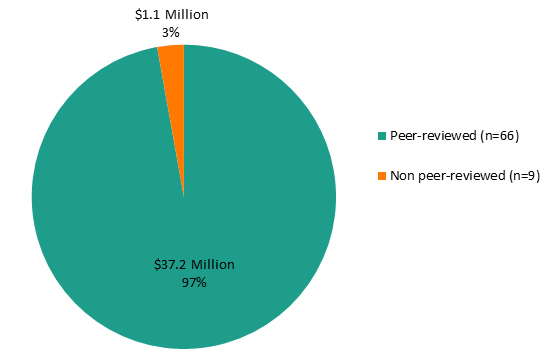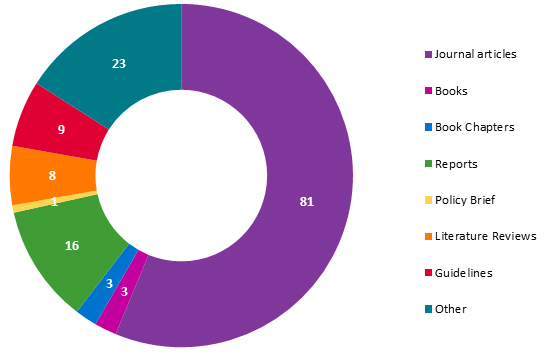CBPHC Innovation Team Grants : Mid-term report highlights
Summary at the mid-term
In December 2015, the mid-way point of the 5-year CBPHC Innovation Team Grants, the teams submitted mid-term reports. The focus of the mid-term reporting was designed around a common set of questions asked of all teams that were grounded in the Canadian Academy of Health Sciences research impact categories – advancing knowledge, building capacity, informing decision making, health impacts and broad social and economic impacts.
Specific reporting included an overall summary of progress since awarding of funds, description of the Innovation team (including breadth and reach), governance of the research program, collaborative and integrated KT mechanisms, common indicators project, synergies, methods for advancing knowledge (i.e., publications, presentations and media), interdisciplinary and inter-professional capacity building, training and mentoring, leveraging and return-on-investment, critical success factors for the team’s program, value-added of programmatic funding and approach to cross-jurisdictional comparative research, unintended outcomes and unrealized objectives, and lessons learned.
The reports were reviewed by CIHR program staff. The following is a brief summary presenting a snapshot of the progress and outputs of this program from the start of the teams in April 2013 up to November 2015.
Engaging Partners and Decision Makers
Engaging key partners and decision makers within the team was seen as a critical step toward supporting broader implementation, scale-up and sustainability of the interventions and findings generated through this initiative. At a more practical level, the teams found that this also helped the research to stay connected to the region where it was being conducted and be grounded in the community’s needs. They have been able to validate research findings and establish greater transparency and trust between different parties. The teams partnered with national and provincial decision makers, local partners such as First Nations communities, patients, decision makers and CBPHC practitioners, and in some cases they have recruited international scientific advisors.
| 127 New team members engaged |
The teams range in size from three to 36 members, and together they have engaged between two and 50 new partners and other stakeholders. There are substantial variations between the number of new team members identified within the 12 mid-term reports and a large mix of new team members (e.g. co-investigators, community representatives, collaborators, decision makers).
Building Capacity
The CBPHC teams employ a range of trainees from a variety of academic settings, including international trainees. The teams facilitated training and mentorship in a variety of ways, and have created a capacity-building working group across the 12 teams with a leadership team of 12 trainees, one from each of the teams. The teams also had an explicit partnership with Transdisciplinary Understandings and Training on Research – Primary Health Care (TUTOR-PHC). In the 2015-2016 TUTOR-PHC year, 25% of the Canadian trainees were affiliated with CBPHC teams.
In total, 187 trainees have been involved across all of the CBPHC Innovation Teams. Of these, 48.7% (n=91) were paid directly through an Innovation team grant, while the other 51.3% (n=96) were not paid through the grant.
| 24 Postdoctoral Fellows |
16 Post Health Professional Degree |
35 PhD Candidates |
57 Masters Students |
55 Undergrad Students |
Trainees have acquired skills by leading the preparation of manuscripts for publication or posters for presentation at conferences, and they have been encouraged and supported to attend and present at conferences and workshops. They have also worked with decision makers in the process for reviewing manuscripts, allowing them an opportunity for both feedback and authorship.
Leveraged Funds for Additional Research and Scale-up
The CBPHC Innovation teams have successfully used their research programs as a platform to leverage additional funds through CIHR and other granting agencies. In total, the teams have collectively leveraged over $38.2 million, primarily through peer-reviewed granting programs.
Funds leveraged

Long description
The teams have leveraged over $38.2 million from other funding sources, of which $37.2 (97%) is through peer reviewed and $1.1 million (3%) is through non-peer reviewed granting programs.
Publications

Long description
The CBPHC Innovation Teams have produced a total of 294 publications, including 81 journal articles, 3 books, 3 book chapters, 16 reports, 1 policy brief, 8 literature reviews, 9 guidelines and 23 other types of publications.
Advancing Knowledge
The CBPHC Innovation Teams have produced a total of 294 publications in a variety of formats including journal articles, books, book chapters, technical reports, policy briefs, literature reviews, policy guidelines and other products. Journal articles were the most frequently published and/or submitted.
Collectively, the CBPHC teams made just over 500 presentations at conferences, workshops and invited presentations to policy and practice audiences. In addition, the teams’ work has generated media coverage within Canada and internationally and included print, broadcast and Internet and resulted in a total of 161 counts across teams.
| 297 Conference Abstracts |
66 Invited Conference Presentations |
24 Invited Workshop Talks |
84 Invited presentations to policy or practice audiences |
33 Other presentations |
- Date modified: